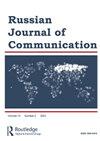联想探讨现代俄罗斯文化中的羞耻观念:从改革后的自由到现代的威权主义
Q1 Social Sciences
引用次数: 0
摘要
本文分析了20世纪90年代初和21世纪初两个俄罗斯发展时期俄罗斯人语言意识中的羞耻概念。并置关联实验的数据,以证明俄罗斯人的世界观发生了变化,在过渡过程中,从二十世纪到二十一世纪。两个俄罗斯样本之间最显著的区别在于,一些21世纪的俄罗斯受访者愿意对羞耻发表负面评论,而20世纪90年代的俄罗斯受访者并不认为羞耻是一种负面现象。所有这些发现都使我们有可能断言,虽然俄罗斯人世界观的文化核心没有改变,但政治动荡引发了俄罗斯人对羞耻的看法的改变。本文章由计算机程序翻译,如有差异,请以英文原文为准。
Association probe into the notion of shame in modern Russian culture: from post-perestroika freedom to modern authoritarianism
ABSTRACT This article provides an analysis of the notion of shame in the language consciousness of Russians during two periods of Russia’s development – the early 1990s and the early twenty-first century. The data of association experiments are juxtaposed to demonstrate the change that occurred in Russians’ worldview in the course of transition from the twentieth to the twenty-first century. The most striking difference between two Russian samplings consisted in the willingness of some twenty-first-century Russian respondents to comment on shame negatively, while 1990s Russian respondents did not comprehend shame as a negative phenomenon. All findings make it possible to assert that while the cultural core of Russians’ worldview remained unchanged, political perturbations triggered alterations in Russians’ perception of shame.
求助全文
通过发布文献求助,成功后即可免费获取论文全文。
去求助
来源期刊

Russian Journal of Communication
Social Sciences-Political Science and International Relations
自引率
0.00%
发文量
0
期刊介绍:
Russian Journal of Communication (RJC) is an international peer-reviewed academic publication devoted to studies of communication in, with, and about Russia and Russian-speaking communities around the world. RJC welcomes both humanistic and social scientific scholarly approaches to communication, which is broadly construed to include mediated information as well as face-to-face interactions. RJC seeks papers and book reviews on topics including philosophy of communication, traditional and new media, film, literature, rhetoric, journalism, information-communication technologies, cultural practices, organizational and group dynamics, interpersonal communication, communication in instructional contexts, advertising, public relations, political campaigns, legal proceedings, environmental and health matters, and communication policy.
 求助内容:
求助内容: 应助结果提醒方式:
应助结果提醒方式:


